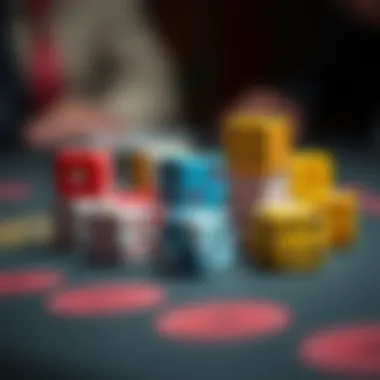Comparing Yahtzee and Texas Hold'em: Chance and Strategy


Intro
When we dissect the world of gaming, Yahtzee and Texas Hold'em emerge as distinct entities, yet both thrive on the thrill of chance and strategy. At first glance, they may seem worlds apart, but when you look closer, there exists a curious intersection between the two. Though one relies heavily on dice rolls and the other on poker cards, both games offer a unique blend of luck and skill that captivates players.
In this exploration, we'll peel back the layers surrounding each game, diving into betting strategies, gameplay techniques, and the psychological elements at play. By doing so, we hope to reveal the subtle and not-so-subtle methods that bind Yahtzee to Texas Hold'em. This comparative analysis not only shines a light on each game's mechanics but also examines their cultural impact and the reasons behind their enduring appeal.
Betting Strategies
Betting is a vital component of both Yahtzee and Texas Hold'em. In each game, understanding how to place bets can be the difference between victory and loss. This section looks into various betting approaches used by players to maximize their chances of success.
Understanding Betting Odds
Betting odds are at the very heart of the gambling experience. Without a solid grasp of how odds work, whether you’re rolling dice or holding cards, you could end up playing blind, so to speak. In Texas Hold'em, for instance, players often calculate pot odds to determine if they should continue in a hand based on the potential payout versus the cost of calling a bet.
In Yahtzee, while not traditionally associated with betting, the stakes can be raised among friends during casual games. The odds can come down to factors like previous rolls and the likelihood of hitting a big score, such as a Yahtzee!
Different Types of Betting Systems
Here are a few of the common betting systems that players might find helpful:
- Martingale System: Predicated on the idea of doubling your bet after a loss, this system can be risky but sometimes pays off in games like Texas Hold'em when players are trying to recoup losses.
- Fibonacci System: This betting method involves placing bets that follow a Fibonacci sequence. The idea is that after a loss, you step back to the previous two bets and continue the climb.
- Fixed Betting: Sometimes, sticking to a set amount can be a sound strategy, whether you're enjoying a quiet game of Yahtzee or sitting at a poker table. This approach minimizes the risk of significant losses.
Both games, despite their differences, link closely to the concept of managing one’s bankroll effectively. Betting is not merely about luck; it requires intuition, knowledge of the game, and sometimes, a bit of psychological savvy.
Poker Techniques
Delving into techniques associated with poker can shed light on how strategy can change the game's dynamics. While Yahtzee does not have the same depth of tactical play as poker, the parallels can still be informative. From beginner basics to advanced maneuvers, understanding these strategies can elevate your gameplay.
Essential Poker Strategies for Beginners
For those just starting with Texas Hold'em, grasping fundamental strategies is essential:
- Starting Hand Selection: This can often dictate the flow of the game. Knowing which hands to play can save you from unnecessary losses.
- Position Awareness: It’s crucial to understand the advantages and disadvantages of your seat at the table. Being last to act often provides a tactical edge.
- Reading Opponents: Observing betting patterns and behaviors can give clues about an opponent’s hand strength.
Advanced Tactics for Seasoned Players
For players who have spent time honing their skills, the strategies deepen:
- Bluffing: A skillful bluff can win the hand without needing a strong hand. Execution is key; understanding when to bluff is what separates a novice from a pro.
- Semi-Bluffing: This involves betting with a drawing hand. If your bluff doesn’t work, you might hit your draw and still win.
- Pot Control: Managing the size of the pot can be crucial, especially with marginal hands. Sometimes it pays to keep the pot small, especially if you're unsure of your standing.
"The best poker players are often the most patient. Knowing when to fold can be as important as knowing when to bet."
Both Yahtzee and Texas Hold'em offer rich landscapes for players willing to engage with the deeper strategies and intricate psychology behind gambling. By understanding the betting strategies and techniques associated with poker, players of Yahtzee can also experiment with their approach, enriching their experience with dice. The detailed juxtaposition of the two games reveals not just how they differ, but how they can teach players important lessons in strategy and decision-making.
Prelude to Gamble Games
Gambling games have a way of weaving through cultures, histories, and social settings, uniting diverse groups of people with a single thread: the thrill of chance and strategy. This article investigates how two seemingly distinct games, Yahtzee and Texas Hold'em, hold a mirror to the psychology and dynamics of gambling, highlighting different yet interconnected approaches to enjoyment.
With the rise of online platforms and mobile gaming, gambling has morphed into a multi-faceted industry that attracts varied participants. Whether at a casino table or in a living room filled with laughter, each game has a charm that beckons players. Yahtzee calls for a dance of dice as luck plays a significant role, while Texas Hold'em invites players to engage in a battle of wits, where strategy and psychology reign supreme. Together, they create a fascinating canvas illustrating the broader human experience of risk and reward.
In exploring the facets of gambling games, one can delve into elements such as the excitement of rolling the dice, the carefully calculated risks involved in betting, and the unique psychological aspects that govern player behavior. Such analysis serves not just to understand these games in isolation but also to uncover what they reveal about the ways we interact with chance and other players.
Understanding the Appeal of Dice and Cards
The allure of games like Yahtzee and Texas Hold'em lies in their ability to engage players on multiple levels. At its core, dice rolling represents sheer randomness. No matter how skilled a player might be, the outcome can drastically change with a single toss. This unpredictability captures a certain charm, allowing anyone to taste victory, often against the odds.
On the flip side, the structured play of Texas Hold'em embodies more of a battleground. Here, players wrestle not just against luck but against each other. The stakes rise with every deal, transforming the table into a theater of strategy and deception. The psychological warfare—reading opponents, bluffing, and betting patterns—adds layers of complexity that appeal profoundly to strategic thinkers.


Gambling becomes more than a means to pass time; it provides an avenue for socialization, competition, and thrill that resonates across generations and societal divides.
Cultural Impact of Gaming Mechanisms
The impact of these games can be felt well beyond the confines of their immediate play areas. They have seeped into popular culture, shaping attitudes towards risk, chance, and decision making. Take Yahtzee, which has been a staple in many families' game nights for decades. It reflects a leisurely approach to gaming, emphasizing fun over high stakes and making it accessible to all ages.
In contrast, Texas Hold'em, especially through televised tournaments, has garnered a reputation for showcasing the high-octane nature of competitive gambling. It illustrates the glitz and glam associated with poker, appealing not only to seasoned players but also to spectators eager to grasp the nuances of the game. This kind of exposure has influenced public perception and built a community around the sport of poker.
Moreover, gaming mechanisms themselves have sparked new trends and innovations in gaming. The evolution of technology and online gaming platforms has resulted in hybrid forms, merging elements of both dice and card play that cater to an ever-growing demographic of gamers.
These cultural impacts illuminate how games like Yahtzee and Texas Hold'em transcend mere entertainment. They mirror society's intricate relationship with risk, reward, and social interaction, embedding themselves into the cultural fabric in fascinating ways.
Yahtzee: A Game of Chance and Strategy
Yahtzee, often thought of as just a game of luck, involves a surprising amount of strategy that can greatly influence the outcome. This dual nature of the game—as both a gamble and a way to strategize—makes it an intriguing point of comparison with Texas Hold'em. The role of chance cannot be underestimated; after all, it hinges on the roll of the dice. Yet, the decisions players make in response to their rolls also show a depth of tactical thinking. Understanding Yahtzee sets a strong foundation for analyzing how games with elements of chance can still be shaped significantly by player choices.
Rules and Mechanics of Yahtzee
At its core, Yahtzee is simple: players roll five dice, trying to make certain combinations that score points based on prescribed categories. Each player has a score sheet that lists the various scoring options from single numbers to full house and yahtzees themselves. Players roll the dice up to three times for each turn, keeping or rerolling dice to enhance their chances of scoring the highest possible points.
One unique aspect of the game is that players can only score in each category once, which introduces layers of strategy. For instance, if a player rolls a three of a kind, they must decide whether to retain it or gamble for a riskier but potentially higher-scoring category like a large straight or a full house. This choice is often weighed against what's already been scored, highlighting how player decisions and timing can impact overall success in the game.
Probability and Scoring Strategies
Probability plays a significant role in Yahtzee. The decisions a player makes hinge on statistical odds, giving a unique flavor to the game.
Optimal Dice Combinations
When considering Optimal Dice Combinations, players often look for the most scoring potential within their rolls. The characteristics of these combinations can greatly affect outcomes. For instance, to achieve the highest score possible from a single roll, aiming for a Yahtzee (five of a kind) is typically the best approach. However, rarer combinations, such as a large straight, can also be desirable if only a few chances remain on the score sheet.
The beauty of Optimal Dice Combinations lies in their versatility. A player might find themselves in a situation where a three of a kind could easily morph into two pairs through strategic rerolls. Crafting the right combinations not only satisfies the immediate goal of scoring but also sets up the player for future rounds, making it a well-rounded choice for anyone seeking an advantage.
Risk Assessment in Decision-Making
Risk Assessment in Decision-Making is another crucial aspect of Yahtzee. Players must often weigh the potential risk of rerolling dice against the rewards of keeping a successful set. This thought process includes evaluating the current state of their score sheet against the probability of rolling needed numbers.
For instance, holding onto a three of a kind to try for a full house could potentially hinder future scoring chances. The unique feature of this risk assessment is that it requires both an analytical mind and an intuitive understanding of when to stick or twist. Knowing when to take that chance often differentiates successful players from those who fall short, making it both an exciting and sometimes nerve-wracking aspect of the game.
Player Psychology in Yahtzee
Psychology plays a big role in how players approach Yahtzee. As they make decisions based on their rolls, they also navigate their emotional responses and the dynamics of competition with other players. The tension that builds with each roll can influence not only their choices but also how they perceive the actions of opponents.
Moreover, understanding one's own tendencies—whether they often play conservatively or take risks—can help in adjusting approach during gameplay. Veteran players might even note how others react under pressure, using those insights to their advantage. It’s the blend of mechanical rules, strategic thinking, and psychological insight that keeps Yahtzee not only engaging but also a rich comparison point with Texas Hold’em.
Texas Hold'em: The Strategic Card Game
Texas Hold'em stands as a giant in the landscape of card games. Its blend of strategy, psychology, and risk has attracted countless players—from casual enthusiasts to seasoned professionals. This section delves deeply into how Texas Hold'em operates and why it holds such significance in the context of gambling and gaming as a whole.
Overview of Rules and Game Flow
Texas Hold'em follows a structure that is both intricate yet approachable. Each player starts with two private cards—known as hole cards—and aims to create the best five-card hand. The game begins with a round of betting, during which players can choose to call, raise, or fold. What follows is the sharing of community cards: the flop, turn, and river. Each stage brings another opportunity for betting, reflecting the game's dynamic blend of chance and choice.
The flow is punctuated by strategic layers. Players must weigh their starting hands against the evolving community cards, observing their opponents’ behaviors for hints about their intentions. Engaging with this ever-changing landscape makes a single game exciting, often leading to tense standoffs and dramatic bluffs. In essence, understanding this flow is crucial for anyone looking to leverage both skill and luck in the pursuit of victory.
Betting Structures and Game Variants
Betting structures can drastically alter the dynamics of a poker game. The two primary types of betting structures in Texas Hold'em are Fixed Limit and No Limit, each possessing distinct aspects that attract different players.


Fixed Limit vs. No Limit
In Fixed Limit games, the betting amounts are predetermined. For instance, a player may only bet or raise a specific amount during each round. The finite nature of bets contributes to a more conservative style of play, allowing for a calculated approach as opposed to taking wild risks. This structure is often favored by beginners who appreciate clear boundaries and more predictable outcomes.
On the other hand, No Limit poker offers the thrill of immense stakes. Players can bet any amount of their chip stack at any time, which introduces a whole new level of strategy. The potential for big wins—or devastating losses—creates an exhilarating environment, often resulting in dramatic and decisive moments in the game. While this variant can amplify the excitement, it also demands a stronger understanding of odds and opponent psychology.
Tournaments and Cash Games
Another critical aspect of Texas Hold'em is the distinction between tournaments and cash games. Tournaments typically require players to pay an entrance fee for a chance to win a larger pool. The structure usually leads to a more prolonged play experience, with players gradually being eliminated until a champion is crowned. This format fosters a unique environment established on resilience and strategic recovery, as players must navigate through adversities.
Cash games, in contrast, offer a more casual atmosphere. Players buy in for a set amount and can leave at any time, keeping what's left of their chips. This flexibility attracts a wide range of players looking to enjoy the game at a less competitive pace. Cash games allow for immediate, tangible rewards, catering to those who prefer to play at their own discretion.
Psychological Tactics in Poker
Poker is often portrayed as a game of cards, but at its core, it is really a duel of minds. Psychological elements play a pivotal role in determining the outcomes. Understanding human behavior—both your own and that of your opponents—is almost as important as the cards themselves.
Players often employ tactics like the bluff to deceive others into making bad decisions. Recognizing the tells of an opponent—small, often unconscious actions that divulge their strength or weakness—can tip the scales greatly in one’s favor. Engaging in psychological warfare becomes a matter of survival, creating an electrifying tension that permeates every round.
Comparative Analysis of Game Dynamics
Engaging in a deep dive into the comparative analysis of game dynamics illuminates the intricate mechanics that govern interactions within Yahtzee and Texas Hold'em. This exploration provides valuable insights into how each game operates on a fundamental level, revealing the interplay of chance and skill, social dynamics, and player psychology. The importance of this topic cannot be overstated, as it frames how players perceive risks and rewards while making decisions throughout each game. By recognizing these dynamics, players can enhance their understanding and efficacy in both gaming environments.
Chance vs. Skill: A Critical Examination
At its core, the battle between chance and skill stands as a defining element in the experience of Yahtzee and Texas Hold'em. Yahtzee offers a vivid representation of chance, with the roll of the dice determining the immediate outcome of each round. Yet, skill manifests through players' adeptness in forming strategies based on probability, maximizing scoring potential, and understanding which combinations to aim for during gameplay. The margins between luck and skill can be thin, creating a captivating tension as players evaluate their decisions against unpredictable outcomes.
In contrast, Texas Hold'em presents a more strategic landscape where the skill of reading opponents and calculating odds comes into play significantly. Players must consider not only their own cards but also the potential of what others hold based on previous actions. The psychological aspect ratchets up the stakes, as a player’s perception of others’ motivations can sway the decision-making process dramatically.
In analyzing the balance of these two elements across both games, it becomes apparent that while Yahtzee leans significantly on chance, skill cannot be entirely dismissed. Conversely, Texas Hold'em relies heavily on player skill, placing less emphasis on luck.
"In gaming, the delicate dance of chance and skill often fuels the thrill of the game, creating gripping narratives unique to each experience."
Social Interaction and Game Atmosphere
The social interaction within Yahtzee and Texas Hold'em showcases the cultural fabric of gaming environments. Yahtzee typically fosters a casual game night atmosphere, where family and friends gather, often around a dining table, laughing and sharing stories as they roll dice. The interaction in Yahtzee is more lighthearted, and the game’s pace allows for casual chit-chat, bringing a sense of community to game night. This fosters bonding as players encourage one another and share in the fortunes and misfortunes of their dice rolls.
Texas Hold'em, however, presents a starkly different vibe. Known for its competitive thrill, poker tables often exude an electric atmosphere punctuated by tension and strategy. Players are likely to adopt personas, calculating their opponents' reactions while maintaining a stoic face to evade suspicion. Here, social cues and psychological warfare become part and parcel of the gameplay experience, as players seek to bluff or ascertain the strength of their opponents’ hands.
This variance in social interaction is not merely stylistic; it shapes how players engage with strategy and decision-making. In Yahtzee, strategy is more about individual gameplay and less about rival dynamics. On the contrary, Texas Hold’em requires an astute understanding of shared information in a much more interactive environment—where what you say and how you project confidence can shift the odds dramatically.
The examination of these social mechanics enriches our understanding of the broader implications each game holds within the context of culture and community.
For further reading, consider exploring Wikipedia’s game theory overview or Britannica on the cultural significance of games. These resources outline how games, like Yahtzee and Texas Hold’em, are not simply entertainment; they are reflections of social constructs and cultural practices.
The Role of Strategy in Yahtzee and Texas Hold'em
In both Yahtzee and Texas Hold'em, strategy plays a pivotal role that can often make the difference between winning and losing. While the former relies heavily on chance—what numbers roll on the dice—players can still deploy solid strategies to maximize their scores. Texas Hold'em, on the other hand, is significantly influenced by players' decisions based on incomplete information. Therefore, understanding the strategies in each game is crucial for success.
Players in these games often grapple with the weight of decision-making, trying to balance risk with reward. The strategic landscape is complex, and varying approaches can lead to different outcomes in ways that shape the overall gaming experience. By studying the role of strategy in both games, players can outsmart their opponents, regardless of the game’s inherent nature.
Long-Term vs. Short-Term Strategies
The distinction between long-term and short-term strategies is essential in shaping gameplay. In Yahtzee, while short-term strategies may involve aiming for specific scoring opportunities, long-term strategies require a holistic understanding of the game's mechanics and potential outcomes.
- Short-Term Strategies: Players may focus on achieving immediate goals, like securing a Yahtzee or picking up a triple on a roll. These decisions are influenced by probability, as specific combinations yield higher scores.
- Long-Term Strategies: These strategies usually involve a broader vision of how individual games fit into a player's overall performance. For instance, a player may choose to prioritize certain combinations over others based on past scores and successes. Long-term success in Yahtzee often comes after numerous games in which players refine their techniques.
In Texas Hold'em, the game flows differently due to the betting rounds and the psychological elements involved.


- Short-Term Strategies: A player may decide to bluff to take down a pot without the best hand. This impulsive play can fetch quick rewards but may not prove successful over a more extended period.
- Long-Term Strategies: Successful poker players typically recognize when to fold and when to push for a pot based on their understanding of the odds and their opponents’ tendencies. Adopted over time, these strategies require a commitment to a consistent playing style while maximizing potential winnings across different sessions.
Adapting Strategy Based on Opponent Behavior
Reading opponents in both games informs how one strategizes. Observing behaviors, betting patterns, and reaction to plays can guide players in adapting their strategies.
In Yahtzee, player strategies are more fixed, but you can still pick your moves based on how aggressive fellow players are when aiming for specific combinations. For instance, if someone is consistently aiming for a full house, you might focus your efforts on blocking that route by rolling for higher scoring combinations.
Conversely, Texas Hold'em requires sharper, more immediate adaptations. Noticing that an opponent tends to bluff often should influence your decision to call their bets. On top of that, a player who plays aggressively after every flop might signify a pattern that can be used against them.
- Key Aspects to Consider:
- Pay attention to betting sizes: Are they consistent, or do they vary?
- Watch for tells: Does your opponent fidget or maintain eye contact?
- Consider past plays: How has their strategy changed as the game unfolds?
Adapting one’s strategy according to the nuances of opponent behavior can be the edge you need to win the game, whether it’s rolling dice or bluffing at the table.
Cultural Significance of Both Games
The cultural significance of Yahtzee and Texas Hold'em extends well beyond their mechanics and gameplay. These games serve as mirrors reflecting societal values, historical developments, and the evolution of leisure culture. Examining their impact reveals much about how we, as a society, engage with chance, skill, and social interaction.
Historical Context and Evolution
Both games have an intriguing backstory that informs their modern-day appeal.
- Yahtzee traces its roots back to the early 20th century. Originally called "Yacht," its origins are debated, with some attributing it to a game played by wealthy yacht owners in the 1950s. As the game transitioned into a household staple, its shift from a luxury pastime to a family tradition illustrates the democratization of leisure activities.
- Texas Hold'em, on the other hand, originated in the early 1900s in the gambling halls of Robstown, Texas. Its rise to fame came in the late 20th century, culminating in what many call the poker explosion, particularly post-2003 when the World Series of Poker took center stage. This evolution reflects a broader social acceptance of gambling, evolving from clandestine practices to mainstream entertainment.
Through time, both games have not just adapted but thrived, drawing players from varied demographics and backgrounds. This adaptability speaks volumes about their resonance within cultural narratives. "Games are the biggest teacher," says Poker pro Daniel Negreanu, highlighting how both mediums can educate players on life through strategic thinking and risk assessment.
Global Popularity and Adaptations
The global reach of both Yahtzee and Texas Hold'em is emblematic of the ways in which games evolve in cultural contexts.
- Yahtzee has been embraced in various forms worldwide. For example, international variations include "Yatzy" in Scandinavia. Its simplicity makes it appealing to families and casual players alike. You can find people enjoying the game in living rooms, community centers, and even global tournaments. This widespread acceptance underscores a cultural desire for connection and shared experiences.
- Texas Hold'em has, meanwhile, seen adaptations that blend local cultures into its gameplay. In different regions, you might find personalized rules or community-driven tournaments that reflect local customs. Its presence in film and media has further solidified its status, making poker nights as common as game nights. The rise of online poker platforms has made the game accessible to millions, transcending geographical barriers.
This globalization of gameplay encourages a sense of community, with players sharing strategies and stories across borders, effectively creating a rich tapestry of gambling culture. The adaptability of both games to fit into various contexts shows their enduring appeal and cultural resonance.
Ending: Bridging the Gap Between Yahtzee and Texas Hold'em
In unpacking the nuances between Yahtzee and Texas Hold'em, this comparative analysis highlights that at the core of both games lies an intricate balance of chance and strategic thinking. While they stem from different backgrounds—Yahtzee as a simple dice game enjoyed around family tables and Texas Hold'em as a high-stakes poker game drawing crowds in casinos—the similarities in player engagement and psychology tell a deeper narrative.
The important takeaway here is that both games offer unique avenues for learning important life skills. Players develop critical thinking, risk assessment, and interpersonal skills, all while enjoying these games in diverse settings. They also showcase how different gaming formats can encourage social interaction, revealing various styles of competition and cooperation.
Through this exploration, one can see that while the mechanics may differ—Yahtzee relies heavily on the luck of the dice and Texas Hold'em emphasizes strategic play—both engage players on an emotional level. This intersection raises questions about what constitutes a compelling gaming experience.
"Gaming is not just about winning but about the interactions, the experiences, and the lessons gathered along the way."
Lessons Learned from Comparative Gaming
By examining Yahtzee and Texas Hold'em side by side, several lessons emerge. First and foremost is the appreciation of diversity in gaming experiences. Each game caters to different audiences yet teaches valuable lessons.
- Understanding Risk and Reward: In both games, players must weigh the risks against potential rewards. Yahtzee players quickly learn the value of holding onto certain dice, while Texas Hold'em enthusiasts grasp the importance of reading opponents and making calculated bets.
- Adaptation is Key: Players must adapt their strategies based on others’ behaviors. A Yahtzee player might change their scoring approach if certain dice rolls are unfavorable, just as a poker player might revise their betting strategy if a player's bluff becomes evident.
- Psychological Insights: The psychological tactics at play in both games expose the influence of person-to-person interaction. Whether it's through reading facial expressions or interpreting body language, players sharpen their social skills, which are essential in various walks of life.
Overall, the juxtaposition of these two games shows that each can sharpen one's strategic mindset in distinctive, yet complementary ways.
Future Trends in Game Development
As we head into an era of advanced gaming technology and design, the future promises exciting developments that could potentially merge elements of both Yahtzee and Texas Hold'em. Here’s a look into potential trends:
- Digital Integration: The rise of online gaming platforms is changing the landscape. Imagine a seamless merge of Yahtzee's simple gameplay with Texas Hold'em's rigorous strategies in an online format that allows for real-time interactions.
- Augmented and Virtual Reality: The implementation of AR and VR technologies may revolutionize how these games are experienced. Players could roll dice or interact with a virtual poker table, all while retaining the essence of the original games.
- Customized Gameplay: Future versions of both games could feature customizable rulesets or hybrid formats that blend elements from both, appealing to both casual gamers and seasoned strategists.
Embracing and adapting these technological advances can create opportunities for more immersive and engaging gaming experiences, ensuring that the essence of both Yahtzee and Texas Hold'em continue to thrive in modern contexts.
In sum, the journey through this comparative analysis sheds light on the parallels, differences, and cultural significance of these iconic games, encouraging ongoing exploration in the evolving realm of gaming.







